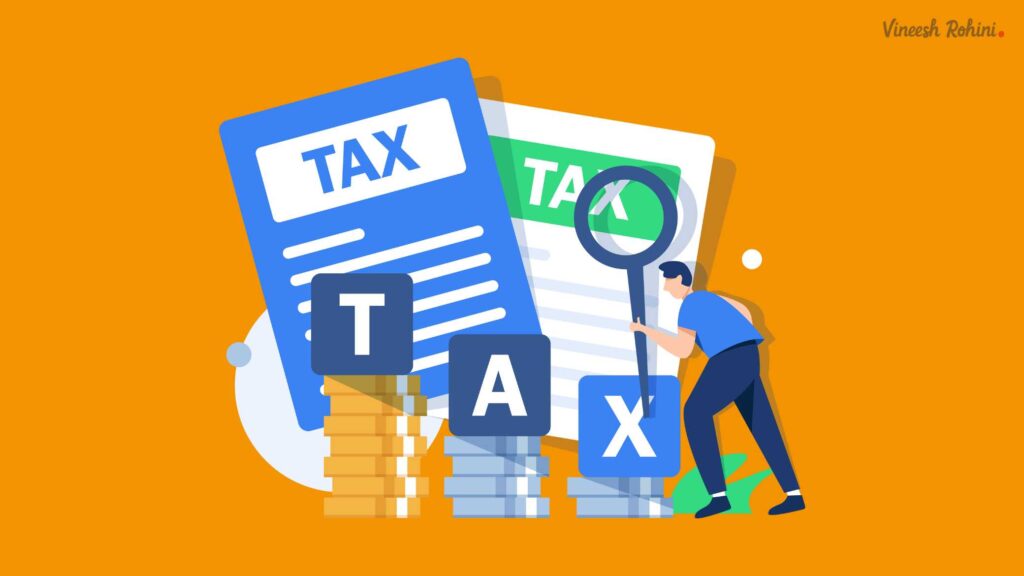What is Income Tax Return (ITR) ? : Comprehensive Guide 2025
What is Income Tax Return : In the ever-evolving economic landscape of India, understanding personal finance and tax obligations is critical for every earning individual and entity. Among the essential components of financial literacy is the concept of Income Tax Return (ITR). As we move into 2025, the Indian government continues to emphasize digital taxation systems, transparent income disclosures, and simplified tax filing procedures. Whether you are a salaried professional, self-employed entrepreneur, business owner, or investor, knowing what Income Tax Return is, how it works, why it’s important, and how to file it efficiently can help you stay compliant and financially empowered.
Table of Contents
This comprehensive guide to Income Tax Return (ITR) in 2025 will walk you through the meaning of ITR, types of ITR forms, eligibility criteria, benefits of filing, step-by-step filing process, key deadlines, penalties for non-compliance, latest updates, and much more—with high-ranking keywords for enhanced visibility and understanding.
📌 What is Income Tax Return (ITR)?

An Income Tax Return (ITR) is a legal document filed by a taxpayer with the Income Tax Department of India, declaring their income, tax liabilities, deductions claimed, and tax paid during a specific financial year. The ITR allows individuals and entities to calculate their tax liability, claim eligible deductions, and request refunds (if any excess tax has been paid).
Also Read : Tax Benefits on Personal Loans in India
Simply put, an ITR is a self-declaration of your annual income and taxes, required under the Income Tax Act, 1961.
📅 What is the Assessment Year (AY) and Financial Year (FY)?
Understanding AY and FY is important for tax filing:
- Financial Year (FY): The year in which you earn the income. For example, FY 2024-25 is the period from 1st April 2024 to 31st March 2025.
- Assessment Year (AY): The year in which you file your ITR for the income earned in the FY. For FY 2024-25, the Assessment Year will be AY 2025-26.
🧾 Who Should File Income Tax Return in India?
Filing an ITR is mandatory for certain categories of taxpayers, and voluntary but beneficial for others.
📍 Mandatory ITR Filing (As per Income Tax Rules 2025)
- Individuals below 60 years with gross total income above ₹2.5 lakh.
- Senior citizens (60–80 years) with income above ₹3 lakh.
- Super senior citizens (80+ years) with income above ₹5 lakh.
- Any person earning income from business or profession (including freelancers).
- Individuals who want to claim a refund of TDS (Tax Deducted at Source).
- Those who hold foreign assets or earn foreign income.
- Residents having signing authority in any foreign account.
- Individuals who have deposited more than ₹1 crore in a bank account.
- People spending more than ₹2 lakh on foreign travel or ₹1 lakh on electricity annually.
📍 Voluntary Filing
Even if your income is below the threshold, you can voluntarily file your ITR to:
- Claim TDS refund
- Maintain financial records
- Apply for visas, loans, or credit cards
- Carry forward capital losses
📂 Types of Income Tax Return Forms (ITR Forms) – Updated for AY 2025-26
The Income Tax Department prescribes different forms based on the type and source of income.
1. ITR-1 (Sahaj)
- For resident individuals (not HUF) having:
- Salary or pension
- One house property
- Other income (interest, etc.)
- Total income up to ₹50 lakh
2. ITR-2
- For individuals and HUFs not having income from business/profession.
3. ITR-3
- For individuals and HUFs having income from a proprietary business or profession.
4. ITR-4 (Sugam)
- For presumptive income from business/profession under Sections 44AD, 44ADA, or 44AE.
5. ITR-5
- For firms, LLPs, AOPs, and BOIs.
6. ITR-6
- For companies other than those claiming exemption under Section 11.
7. ITR-7
- For persons including companies required to furnish return under sections 139(4A), 139(4B), etc.
💡 Benefits of Filing Income Tax Return in 2025
Whether mandatory or not, there are multiple advantages of filing ITR:
✅ 1. Claim Tax Refunds
If excess TDS has been deducted or advance tax paid, you can claim a refund by filing ITR.
✅ 2. Loan and Credit Card Approvals
Banks and financial institutions demand ITR copies as proof of income and financial credibility.
✅ 3. Visa Applications
Foreign embassies often require ITR documents for visa approvals as proof of income stability.
✅ 4. Carry Forward Losses
Filing your return on time allows you to carry forward capital and business losses for future set-off.
✅ 5. Avoid Penalties
Timely filing helps avoid fines and interest under Section 234F and Section 234A/B/C.
✅ 6. Establish Financial Record
Helps in long-term financial planning and wealth management.
🧮 How to Calculate Taxable Income in India?

To file an ITR, one must calculate their gross income, apply deductions, and compute net taxable income.
💼 Components of Income:
- Income from Salary
- Income from House Property
- Income from Business or Profession
- Capital Gains
- Income from Other Sources (interest, lottery, etc.)
📉 Deductions Under Chapter VI-A (Updated for 2025):
- Section 80C: Up to ₹1.5 lakh (LIC, PPF, ELSS, etc.)
- Section 80D: Health insurance premium
- Section 80G: Donations
- Section 80TTA/80TTB: Savings account interest
- Section 24(b): Home loan interest (up to ₹2 lakh)
After deductions, apply tax slab rates as per the new or old regime.
📤 How to File Income Tax Return Online in 2025? (Step-by-Step)
The e-filing process on the Income Tax e-Filing Portal (www . incometax . gov . in) is streamlined for user convenience.
🔄 Step-by-Step Guide:
- Register/Login to the Income Tax Portal.
- Go to ‘File Income Tax Return’.
- Select Assessment Year 2025-26, mode of filing (online/offline), and applicable ITR form.
- Choose the correct status (Individual, HUF, Company, etc.).
- Pre-fill personal and income details using Aadhaar-linked information and Form 26AS.
- Add additional income, deductions, and tax paid.
- Review tax computation and validate details.
- Click ‘Proceed to Verification’.
- Verify using Aadhaar OTP, DSC, or EVC.
- Download and save the acknowledgment (ITR-V).
🗓️ ITR Filing Deadlines for FY 2024–25 (AY 2025–26)
| Category | Due Date |
|---|---|
| Individuals & HUFs | 31st July 2025 |
| Audit Cases (Businesses) | 31st October 2025 |
| Transfer Pricing Cases | 30th November 2025 |
| Revised Return | 31st December 2025 |
⚠️ Penalties for Late Filing of ITR
As per Section 234F of the Income Tax Act:
- ₹5,000 penalty if filed after the due date but before 31st December.
- ₹10,000 penalty if filed after 31st December.
- ₹1,000 penalty for income below ₹5 lakh.
Additionally, late filing may attract interest under Section 234A/B/C.
🔄 Difference Between Old and New Tax Regime (2025)
The government offers two tax regimes—choose the one that offers better tax savings:
| Particulars | Old Regime | New Regime (Default from 2024-25) |
|---|---|---|
| Slabs | Higher | Lower |
| Deductions Allowed | Yes (80C, 80D, etc.) | No |
| Who Should Choose? | High deductions/investments | Low investments |
🧾 Documents Required for ITR Filing
To file an accurate return, keep these documents ready:
- PAN Card
- Aadhaar Card
- Form 16 (from employer)
- Salary Slips
- Interest certificates
- Form 26AS (tax statement)
- Investment proofs (LIC, PPF, ELSS)
- Rental receipts
- Capital gains statements (if applicable)
- Bank account details
🧑💼 ITR Filing for Self-Employed and Freelancers
Self-employed professionals and freelancers must:
- Maintain books of accounts
- Declare income from clients and gigs
- Pay advance tax if liability exceeds ₹10,000/year
- Opt for presumptive taxation under 44ADA if eligible
Filing ITR-3 or ITR-4 is mandatory based on income nature.
🌍 ITR Filing for NRIs (Non-Resident Indians)
NRIs are taxed on income earned or received in India. They must file ITR if:
- Income in India exceeds ₹2.5 lakh
- They earn rental income, interest, capital gains, etc.
- Want to claim a refund or avoid TDS
They cannot use ITR-1; must use ITR-2 or ITR-3.
🔄 Revised and Belated ITRs (2025 Rules)
If you missed the due date or made a mistake:
- Belated Return: File by 31st December 2025 with a penalty.
- Revised Return: Also by 31st December 2025 to correct errors.
🔍 Latest Updates in Income Tax Return Filing for 2025
- Default New Tax Regime: New regime is now default, but old regime can still be opted manually.
- AIS and TIS Statements: Advanced data insights now available in the Annual Information Statement and Taxpayer Information Summary.
- Pre-filled ITRs: Auto-populated data from banks, employers, and mutual funds.
- e-Verification through Aadhaar: Simplified and real-time.
💼 ITR and Business Compliance
Businesses must:
- File ITR-3, ITR-5, or ITR-6 based on structure.
- Conduct mandatory tax audits if turnover exceeds limits.
- Report GST income and reconcile it with ITR.
- Maintain books, invoices, ledgers, and TDS returns.
📌 What is Income Tax Return – Conclusion

In 2025, filing Income Tax Return in India is not just a legal requirement but a cornerstone of responsible financial planning. Whether you’re a salaried employee, a startup founder, a freelancer, or an NRI, staying tax compliant helps you avoid penalties, secure financial products, and contribute to nation-building. With digital systems, pre-filled forms, and simplified portals, filing ITR has become more accessible than ever.
Buy Now : How To Invest Your Money – Master Class
Make it a habit to file your ITR on time, choose the right regime, keep proper records, and optimize your tax savings through legitimate deductions. This guide provides everything you need to know about ITR—from filing steps and eligibility to benefits and legal implications.
📢 Disclaimer : This article is for educational purposes only and does not constitute legal or financial advice. Tax laws may change based on government policies. Always consult a qualified tax advisor or chartered accountant for personalized assistance.
Keywords : What is Income Tax Return – What is Income Tax Return 2025 – What is Income Tax Return Guide



